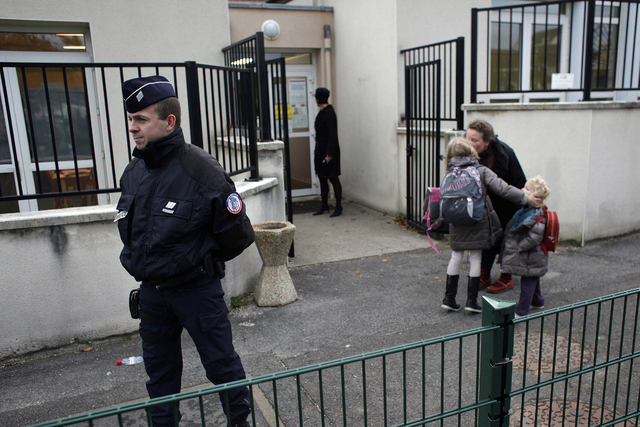‘No Country for Old Men’

Turns out you can go home again.
Martin Scorsese did it with “The Departed” — and finally claimed the Academy Award that eluded him for so long.
And now the Coen brothers, Joel and Ethan, get back to basics with “No Country for Old Men,” based on Cormac McCarthy’s novel of the wild New West.
Great move, guys. Great movie, too.
After the Coens’ misguided “Ladykillers” remake and their tepid romantic comedy “Intolerable Cruelty,” this return to the literal (and psychological) terrain of their arresting 1984 debut, “Blood Simple,” results in the Coens’ best movie since 1996’s “Fargo.”
Like that Oscar-winning triumph, “No Country for Old Men” unearths unlikely, but undeniable, deadpan humor on the blood-soaked trail of a crime spree gone wrong.
Also like “Fargo,” this movie has an unforgettable character.
Yet unlike Marge Gunderson, “Fargo’s” dogged, mega-pregnant top cop, “No Country for Old Men’s” most unforgettable character is not the good guy.
Indeed, he may be the movies’ most chillingly evil guy since Hannibal Lecter. And I suspect even Hannibal the Cannibal might break out in a cold sweat if he ever faced off with Anton Chigurh.
Chigurh’s surname sounds like “chigger,” but this Chigurh doesn’t suck blood, he spills it — rivers of it — while stalking the small towns and wide open spaces of Texas’ Rio Grande country like an angel of death. Except he’s no angel.
Javier Bardem’s knockout performance — a beautifully calibrated blend of haunting intensity and spellbinding control — would be enough to make “No Country for Old Men” an instant classic.
But there’s much more in store.
Craggy Texas son-of-a-gun Tommy Lee Jones, for instance, in yet another role that fits him better’n a pair of custom-made cowboy boots.
And comeback kid Josh Brolin scores another bull’s-eye, after memorable turns in “American Gangster,” “In the Valley of Elah” and even “Grindhouse’s” zombie jamboree “Planet Terror.”
Beyond its central characters, however, “No Country for Old Men” reflects the harsh perspective of its creators: McCarthy and the Coens, who write, produce, direct and even edit their movies (the latter under the pseudonym Roderick Jaynes).
Pulitzer Prize-winner McCarthy’s bleached-bones thriller seems to have brought out a new maturity in the Coens, who uncharacteristically downplay their most impishly idiosyncratic impulses.
On the surface, “No Country for Old Men” deals with a botched drug deal and its nightmarish aftermath. But the movie isn’t about surfaces.
On the contrary, it’s what you don’t see, but know in your bones, that makes all the difference.
Just ask Sheriff Ed Tom Bell (Jones).
It’s 1980. And while the skies of Terrell County may be as high and wide as they were a hundred years ago, there’s no code of the West anymore.
Some of it could be the drugs — and the money that inevitably rides shotgun.
That seems to be the case as Ed Tom and his deputy (Garret Dillahunt) check out a remote crime scene with several bullet-riddled corpses, several bullet-riddled trucks — and a huge stash of heroin.
There also used to be a briefcase with $2 million in cash. But that’s gone, lifted from the scene by good ol’ boy welder Llewelyn Moss (Brolin), who stumbles across the whole unholy mess during a hunting trip and can’t resist the cache of cash.
Not even when he realizes what he’s stumbled into — and who’s on his trail.
“Just how dangerous is he?” someone asks smooth mob troubleshooter Carson Wells (a sly, savvy Woody Harrelson), who hopes to get to Llewelyn — and the stolen money — before Chigurh does.
“Compared to what?” Wells replies. “Bubonic plague?”
Befitting the stone-cold specter at its dark heart, “No Country for Old Men” doesn’t waste a lot of time. In that sense, it’s a different kind of Coen brothers movie, stark and streamlined, with no time for quirky tangents.
It’s also the quietest Coen brothers movie ever, its soundtrack dominated not by longtime composer Carter Burwell’s music but by the ominous silence that envelops everything, from the desolate rural landscape to the deceptively cozy small towns where no one ever sees or hears anything. Not even the mayhem that follows in Chigurh’s wake.
That laconic style extends from the lack of mood music to the screenplay itself, which streamlines McCarthy’s prose while preserving the novel’s essence.
In the process, the Coens make themselves right at home. Stretching the suspense like a high-tension wire that’s about to snap, they also add to the movie’s unsettling impact with audacious visual flair. (But they couldn’t have done it without their indispensable cinematographer, Roger Deakins, who once again demonstrates his dazzling virtuosity, capping an amazing year that also includes “In the Valley of Elah” and the ravishing “The Assassination of Jesse James by the Coward Robert Ford.”)
For all the filmmaking artistry on display, however, it’s the people of “No Country for Old Men” that will haunt you most, from Brolin’s dogged, bullet-dodging ingenuity to Scotland’s own Kelly Macdonald, complete with impeccable West Texas twang, as Llewelyn’s trailer-park sweetheart of a wife.
Jones’ mournful, hangdog countenance belies Sheriff Ed Tom’s mordant wit — that is, until circumstances convince him that the forces of evil are on the march and there’s nothing much good folk can do to stop them. Except, of course, to stay out of Anton Chigurh’s way.
Doing that, however, would mean missing one of the Coens’ (and the year’s) best movies.
But beware. Once you let Anton Chigurh into your brain, he’s likely to rattle around for a while.
Contact movie critic Carol Cling at ccling@reviewjournal.com or (702) 383-0272.